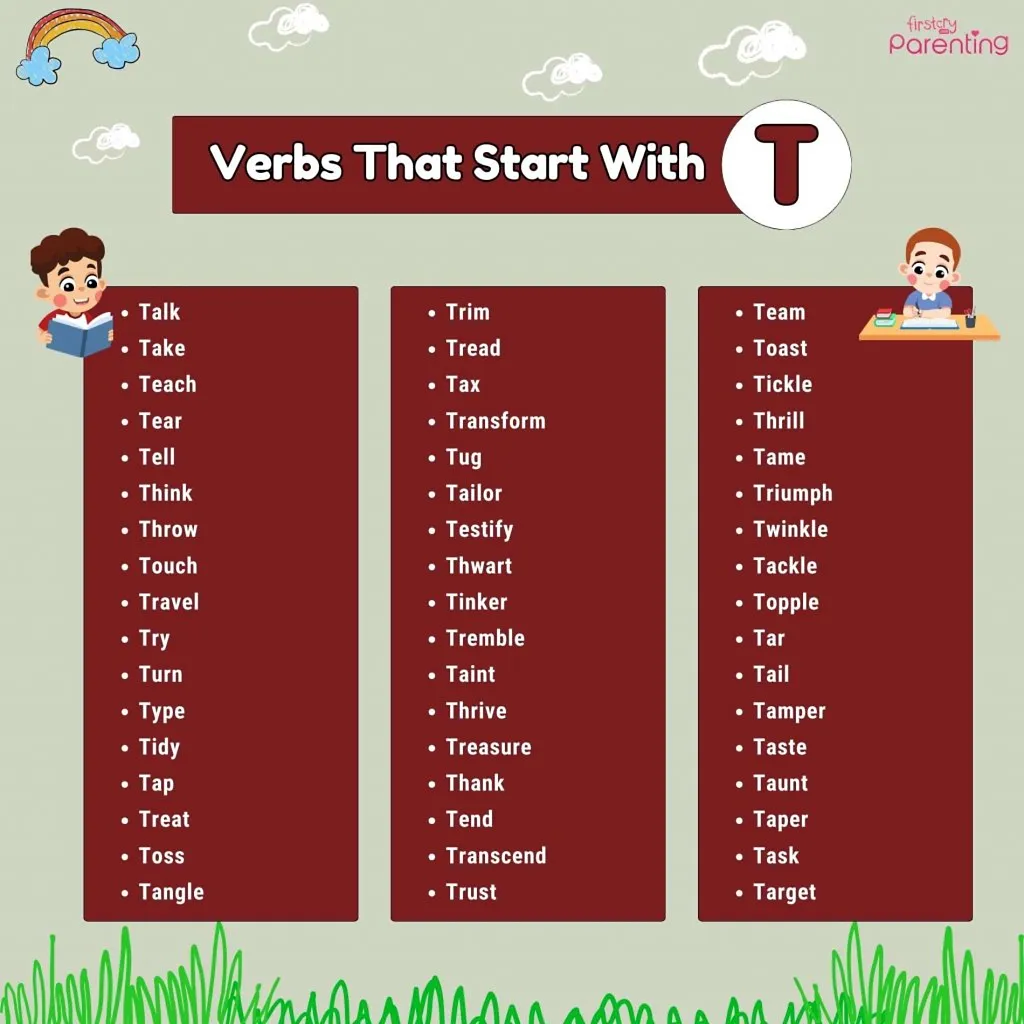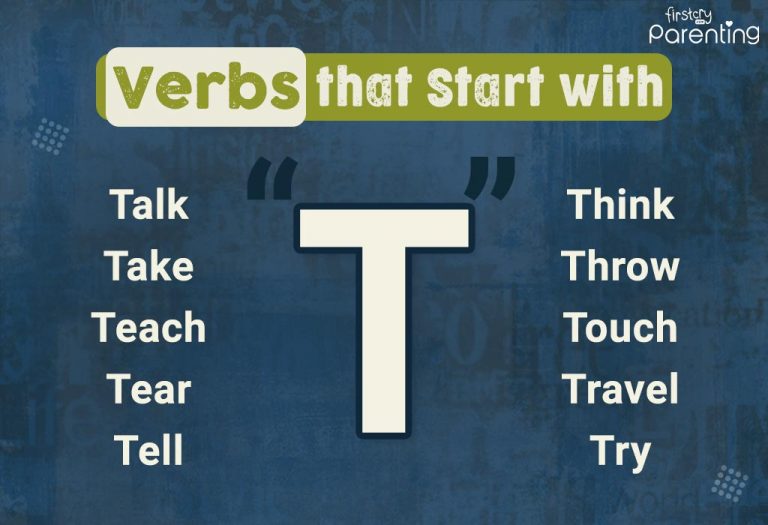Verbs That Start With T in English (With Meanings & Examples)
When building a robust vocabulary for kids, understanding verbs is key to understanding language. Verbs are the action indicators in sentences, reflecting our movement and expressions. Introducing verbs that start with ‘T’ for preschoolers and kids can be an exciting adventure into the world of words.
This exercise enriches their vocabulary and enhances their comprehension and communication skills. Whether it’s storytelling time, engaging in playful learning, or simply conversing throughout the day, including these verbs can transform everyday moments into memorable learning opportunities.
What Are The Verbs Beginning With T?
Verbs starting with the letter ‘T’ are an extensive group of words containing a wide range of actions, states, and occurrences. These verbs with ‘T’ span from simple, everyday activities to more complex processes, offering various expressions for young minds to explore and use. As we explore this category, we’ll discover how these verbs can liven our language and bring depth to our conversations and narration.
Common Verbs Starting With T
This section highlights some of the most common English verbs, starting with ‘T,’ providing young learners a chance to expand their linguistic abilities. Meanings and practical examples support each word to give a better understanding of these verbs.
1. Talk
To communicate or express thoughts through spoken words.
Example: They often talk about their adventures with great enthusiasm.
2. Take
To grasp, carry, or remove something from a place.
Example: She always takes her book to read during the bus ride.
3. Teach
To impart knowledge or skills to someone.
Example: The teacher loves to teach new words to her students.
4. Tear
To pull something apart or into pieces by force.
Example: Be careful not to tear the pages of your book.
5. Tell
To communicate information or a story to someone.
Example: Can you tell me the story of the three little pigs again?
6. Think
To have a particular belief or idea.
Example: I think we should go to the park today.
7. Throw
To propel something with force through the air by moving the arm.
Example: Let’s go outside and throw the frisbee.
8. Touch
To come into contact with something using one’s hands or fingers.
Example: The cat loves it when you gently touch its fur.
9. Travel
To go from one place to another, typically over a distance.
Example: Every summer, we travel to the mountains for a vacation.
10. Try
To make an attempt or effort to do something.
Example: You should always try your best in everything you do.
11. Turn
To move or cause to move in a circular direction.
Example: Please turn the page to continue the story.
12. Type
To write using a keyboard.
Example: She learns to type her name on the computer.
13. Tidy
To make a place or area clean and orderly.
Example: It’s essential to tidy your room every morning.
14. Tap
To strike something lightly, especially to draw attention.
Example: He gently taps on the window to get her attention.
15. Treat
To deal with or behave towards someone or something in a certain way.
Example: We should always treat others with kindness and respect.
Action Verbs that Start With T
Action verbs with ‘T’ are a gateway to expressing physical or actionable processes, making our communications more dynamic and engaging. Let’s explore these English verbs starting with the letter ‘T’ and their meanings and see them in action through examples.
1. Toss
To throw something lightly or carelessly.
Example: She loves to toss the ball to her dog in the park.
2. Tangle
To twist together into a confused mass.
Example: The kitten managed to tangle all the yarn.
3. Trim
To make something neat by cutting away parts.
Example: He goes to the barber every month to trim his hair.
4. Tread
To walk in a specified way.
Example: They tread carefully through the snowy path.
5. Transcribe
To write down or record information.
Example: She needs to transcribe the notes from the meeting.
6. Transform
To make a thorough or dramatic change in form, appearance, or character.
Example: The caterpillar will transform into a butterfly.
7. Tug
To pull something hard or suddenly.
Example: The child tugs at her mother’s hand to get her attention.
8. Tailor
To make or adapt something for a particular purpose, person, or need.
Example: He tailors his speeches to appeal to a younger audience.
9. Testify
To give evidence as a witness in a law court.
Example: The witness was nervous to testify in front of the court.
10. Thwart
To prevent someone from accomplishing something.
Example: The heroes attempt to thwart the villain’s plans.
11. Tinker
To attempt to improve, fix, or repair something in a casual or purposeless way.
Example: He likes to tinker with old radios during his free time.
12. Tremble
To shake involuntarily, typically due to anxiety, excitement, fear, or frailty.
Example: The leaves tremble in the gentle breeze.
13. Taint
To contaminate or pollute something.
Example: That scandal tainted his reputation beyond repair.
Positive Verbs That Start With T
Positive verbs convey actions that bring joy, encouragement, and positivity into our lives. These verbs expand our vocabulary and elevate our conversations, adding optimism and warmth. Let’s explore a collection of positive verbs that start with ‘T,’ each accompanied by its definition and an illustrative example to show how to use them.
1. Thrive
To prosper or flourish.
Example: Under her care, the garden plants thrive and bloom beautifully.
2. Treasure
To value highly or cherish.
Example: He treasures the moments spent with his family above all.
3. Thank
To express gratitude or appreciation.
Example: She always remembers to thank her friends for their support.
4. Tend
To care for or look after; give one’s attention to.
Example: They tend to their community garden with great dedication.
5. Transcend
To go beyond the limits of exceeding.
Example: Her performance transcends what was thought possible.
6. Trust
To believe in the truth, ability, strength, or reliability of something or someone.
Example: I trust you to make the best decision.
7. Team
To come together as a team to achieve a common goal.
Example: We team up on weekends to clean the beach.
8. Toast
To honour or celebrate someone or something with a toast.
Example: Let’s toast to your success in the new job.
9. Tickle
To touch lightly to cause laughter or twitching movements.
Example: She tickled him so hard he fell off the bed with laughter.
10. Thrill
To cause a sudden feeling of excitement, pleasure, or enthrallment.
Example: The roller coaster ride thrills him every time.
11. Tame
To domesticate or bring under control.
Example: She manages to tame the wild horse with patience and love.
12. Triumph
To win or succeed.
Example: Together, we will triumph over the challenges.
13. Twinkle
To shine with a light that varies repeatedly between bright and faint.
Example: His eyes twinkle with joy whenever he talks about astronomy.
More Verbs That Begin With T

Beyond the realms of common, action, and positive verbs, the English language has many verbs with ‘T’ waiting to be discovered. These verbs span various actions, emotions, and processes, further improving vocabulary. This section presents an additional selection of verbs beginning with ‘T’ for easy reference.
| Verb | ||
| Tackle | Topple | Tar |
| Tail | Tamper | Tarnish |
| Tantalise | Taper | Task |
| Target | Tattle | Taste |
| Taunt | Tax | Tauten |
| Tease | Tempt | Teem |
| Temper | Tense | Terminate |
| Tender | Test | Tether |
| Terrify | Thaw | TheoriSe |
| Thatch | Thin | Thrash |
| Thicken | Threaten | Thrust |
| Thread | Throttle | Thrum |
| Thump | Tingle | Tint |
| Tilt | Titillate | Tolerate |
| Tire | Torment | |
This collection of verbs that start with the letter ‘T’ further showcases the diversity and richness of the English language, providing learners with a wide range of verbs to enhance their communication and comprehension skills.
FAQs
1. What simple verbs start with ‘T’ for young learners?
Simple verbs starting with ‘T’ that are great for young learners include ‘talk,’ ‘take,’ ‘teach,’ and ‘throw,’ each of which introduces basic actions clearly and understandably.
2. How can learning verbs that start with ‘T’ enhance a child’s vocabulary?
Learning verbs that start with ‘T’ can significantly enhance a child’s vocabulary by providing various words to express actions and emotions, improving their communication and language skills.
Learning verbs that start with T offers an excellent opportunity to broaden our language skills and improve our conversations. Whether through narratives, daily interactions, or academic endeavours, these verbs add colour and depth to our expressions. Including these verbs in our vocabulary enhances our communication ability and encourages a deeper appreciation of the English language.
Also Read: Verbs That Start With A to Z
| A | B | C | D | E | F | G | H | I | J | K | L | M |
| N | O | P | Q | R | S | T | U | V | W | X | Y | Z |
Was This Article Helpful?
Parenting is a huge responsibility, for you as a caregiver, but also for us as a parenting content platform. We understand that and take our responsibility of creating credible content seriously. FirstCry Parenting articles are written and published only after extensive research using factually sound references to deliver quality content that is accurate, validated by experts, and completely reliable. To understand how we go about creating content that is credible, read our editorial policy here.













.svg)
















